Brief History
Built during the 1800s the building was used as a factory in connection with the then owner, Mr E. L. Barber’s, general building and shop fitting business. With the outbreak of WW1, Mr Barber adapted the factory to manufacture aeroplane propellers supplying the Royal Flying Corps as part of the war effort.
By 1921 the factory had been purchased by a local resident William Southan Morris, who converted the old factory into a then state of the art cinema called The Empire. Initially The Empire had 440 seats, but in 1927 the cinema was enlarged with an additional 340 seats.
Mr Morris eventually owned a number of local cinemas and traded as the Southan Morris Circuit.
In 1933, the Empire was acquired and operated by the Associated British Cinemas, until the opening of their new cinema, The Savoy, in George Street, in central Luton, in 1938.
Although The Empire was reacquired by the Southan Morris Circuit, it never reopened at a cinema.
During World War 2, The Empire was requisitioned for “government purposes”.
The next chapter for 116 Bury Park Road was in 1949, when the local Jewish Community purchased the building and converted it for use as a Synagogue, opening 4 years later in 1953. At that time the local Jewish Community numbered around 2,000 people. The building remained as a Synagogue until 2000, but as the local Jewish Community numbers have reduced, 116 Bury Park Road became too large for their needs and they decided to sell the building and found an alternative building as their place of worship.
The Jewish Community were keen that the building should remain as a place of worship and in 2000 the building was sold to the local Islamic Community, who converted into its current use as a cultural, religious and educational centre for the Islamic Community, which remains as its use today.
Dallow School, Foxdell Infant and Junior Schools and Bury Park Rd Islamic Centre
Results from Childrens’ Work
Schools Involved:
|
|
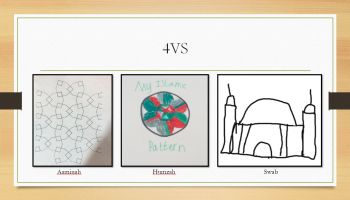 |
Foxdell Junior School |
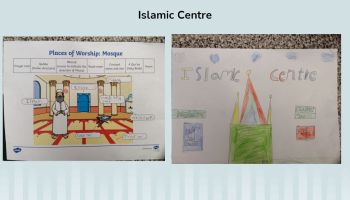 |
Dallow School |
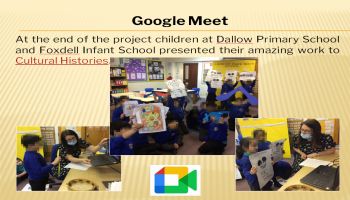 |
Foxdell Infant School |
Historical Summaries Prepared by the Teaching Staff
In preparation for this project the teaching staff in conjuction with Cultural Histories CIC produced a series of Powerpoint presentations to help the school children get started with their investigations into Luton’s past in relation to this building at 116 Bury Park Rd. The following documents look at different aspects of the history of 116 Bury Park Rd from when it was used as a propellor factory during WW1 to its use as a synagogue supporting the Jewish community in the area prior to it becoming the Islamic Centre it is today supporting the Islamic community. They all use the Time Explorers theme developed during the Luton 1919 Peace Riots Centenary celebrations in conjuction with the Chiltern Learning Trust for Key Stage 2 school children.
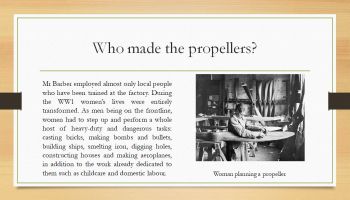 |
Propeller Factory Teacher Input |
 |
Empire Cinema Teacher Input |
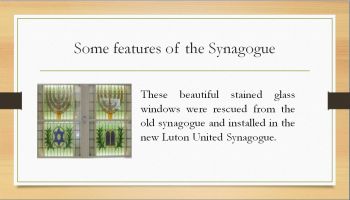 |
Synagogue Teacher Input |
| In total 247 young Lutonians engaged in the project viewing the videos and working with the teaching staff, the children reviewed the research information to learn about the different aspects of the history of 116 Bury Park Road, developing a series of class-based projects.
Comments from the teaching staff included:
|
|
Personal Stories (Recorded Interviews)
We have recorded interviews from:
- Eddie Grabham, the author of ‘Grand to Grove’ the authoritative historical work on theatres and cinemas in Luton and Bedfordshire, who talks about the history of the Empire Cinema,
- Ros Scott, a Luton centenarian, who went to the Empire Cinema in the1930s and shares her experiences,
- Sid Rutstein an Elder from the local Jewish Community, describes how the building was adapted and explains some of the Jewish traditions and religious practices, and
- Mahmood Shah ‘Mumzy’ a community outreach worker at the Islamic Centre, takes you on a virtual tour of the building, describes Islamic traditions and practices and how the centre works with the wider Luton communities.

